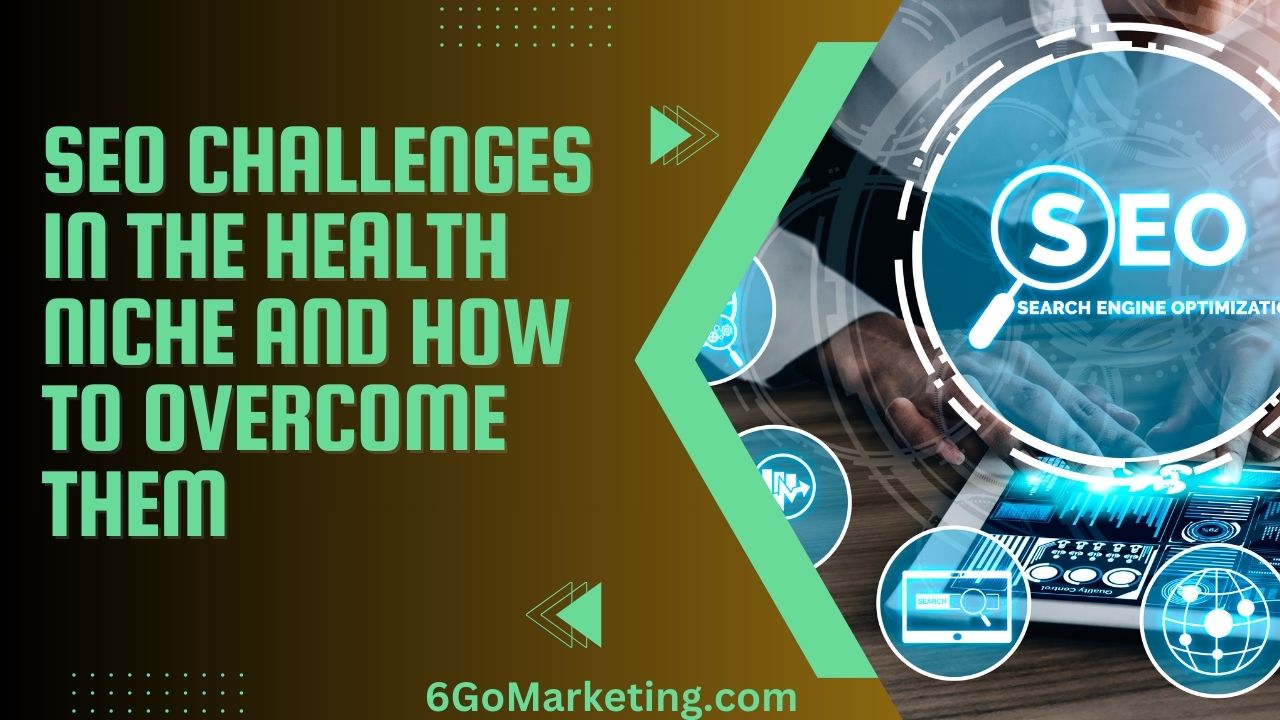Search Engine Optimization (SEO) is an essential strategy for any business aiming to increase online visibility. However, when it comes to the health niche, SEO becomes particularly challenging. This is due to the sensitive nature of the content, strict regulations, and the level of trust needed for users to engage with health-related information. Websites in the health niche, including medical practices, wellness blogs, and pharmaceutical companies, must follow stringent guidelines to ensure accuracy and reliability.
This blog post will explore the major SEO challenges in the health niche and provide actionable strategies to overcome them. By understanding these challenges and implementing the right solutions, health-related websites can build credibility, rank higher in search results, and provide users with valuable, trustworthy information.
Challenge 1: High Competition in the Health Niche
One of the biggest challenges in the health niche is the intense competition for ranking on search engine results pages (SERPs). Health is one of the most searched categories online, and major players like WebMD, Mayo Clinic, and Healthline dominate the SERPs. Competing against these well-established websites can feel like an uphill battle for smaller health sites or individual practitioners.
Why Competition is High in the Health Niche:
- Major Authorities: Trusted health websites and institutions often dominate the top positions in SERPs due to their established domain authority and high-quality content.
- High Search Volumes: People are constantly searching for health and fitness related information, from specific medical conditions to general wellness tips, leading to high competition for keywords.
- Google’s E-A-T Guidelines: Google places significant emphasis on E-A-T (Expertise, Authoritativeness, Trustworthiness) for health-related content, prioritizing websites that have established reputations in these areas.
How to Overcome High Competition:
- Focus on Niche Keywords: Instead of targeting highly competitive general keywords like “diabetes symptoms” or “weight loss,” focus on long-tail keywords that are more specific and have lower competition. For example, instead of “diabetes treatment,” use “natural remedies for type 2 diabetes” or “diabetes diet for beginners.”
- Build E-A-T: To compete with established health websites, it’s important to build your site’s Expertise, Authoritativeness, and Trustworthiness. This can be achieved by:
- Featuring content written or reviewed by medical professionals.
- Including author bios that highlight the expertise of contributors.
- Linking to reputable sources and scientific studies.
- Displaying trust signals such as certifications, accreditations, and partnerships with respected health organizations.
- Create Hyperlocal Content: If you are a healthcare provider or wellness clinic, focusing on local SEO can help you rank for searches within your geographic area. Create content that caters to local audiences, such as blog posts about health concerns in your community or details about local events your practice is involved in.
Table: SEO Strategies to Overcome High Competition
| Strategy | Benefit | Example |
|---|---|---|
| Focus on Niche Keywords | Targets less competitive keywords, higher chance of ranking | Use “low-carb diet for managing diabetes” instead of “diabetes diet” |
| Build E-A-T | Improves credibility, authority, and trustworthiness | Add expert-written content and credentials |
| Hyperlocal SEO | Helps rank for searches within a geographic location | Create content like “Best pediatric care in San Francisco” |
Quote:
“In the health niche, E-A-T is crucial. Google prioritizes authoritative content from experts, so building trust and credibility should be at the forefront of your SEO strategy.” – Lily Ray, SEO Expert
Challenge 2: Google’s Strict YMYL Guidelines
In the health niche, websites often fall under Google’s YMYL (Your Money, Your Life) category. YMYL content includes pages that can impact a person’s health, safety, financial stability, or happiness. Because of the potential consequences of inaccurate health information, Google applies much stricter guidelines to YMYL content to ensure the quality and reliability of the information provided.
The Impact of YMYL Guidelines:
- Higher Scrutiny: Google holds YMYL content to a higher standard, meaning that content needs to be thoroughly researched, accurate, and written by qualified professionals.
- Stricter Ranking Factors: Websites that don’t meet Google’s quality standards for YMYL content are less likely to rank well, even if they have otherwise solid SEO practices.
- More Emphasis on E-A-T: Expertise, Authoritativeness, and Trustworthiness are even more crucial for YMYL sites, particularly in the health niche.
How to Overcome YMYL Challenges:
- Provide High-Quality, Fact-Based Content: Ensure that all health-related content is accurate, evidence-based, and up-to-date. Cite reputable sources such as peer-reviewed studies, government health agencies, or well-known medical organizations. Avoid speculative or unverified health claims.
- Feature Qualified Experts: Content on YMYL pages, especially in the health niche, should be written or reviewed by qualified professionals like doctors, nutritionists, or certified healthcare providers. Include their credentials and links to their profiles to build trust.
- Create a Clear Website Structure: Ensure that your website has a logical, easy-to-navigate structure, with clear categories and a user-friendly layout. This not only improves user experience but also makes it easier for Google to crawl and index your site.
Table: Meeting YMYL Guidelines in the Health Niche
| SEO Practice | Why It Matters for YMYL | Example |
|---|---|---|
| Provide Fact-Based Content | Ensures accuracy and compliance with Google’s quality standards | Cite medical studies, link to reputable health organizations |
| Feature Qualified Experts | Increases trust and authority in the eyes of both users and search engines | Publish content written by doctors or certified nutritionists |
| Use Clear Website Structure | Improves user experience and search engine indexing | Organize health topics into categories like “mental health,” “nutrition” |
Quote:
“For YMYL content, Google demands more than just well-optimized content. You must demonstrate expertise and trustworthiness. In the health niche, this means verified, expert-written content and a clean, professional website layout.” – Marie Haynes, SEO Consultant
Challenge 3: Creating Content that Balances Technical Accuracy with Accessibility
In the health niche, content must strike a delicate balance between technical accuracy and accessibility. While it’s important to provide detailed and accurate medical information, the content should also be understandable to the average reader. If the content is too complex, readers may leave the site or fail to engage with the information, which can hurt your SEO performance.
How to Create Accessible Health Content:
- Simplify Complex Topics: Break down complex medical terms and concepts into simple language. Use analogies, metaphors, or comparisons to make technical content more relatable and easier to understand for non-experts.
- Include Visual Aids: Diagrams, infographics, and videos can help explain complex health concepts in a more digestible way. Visual content can also improve user engagement, which is a positive signal for an SEO audit.
- Use a Conversational Tone: Write in a tone that is friendly and approachable, especially when discussing sensitive health issues. Avoid jargon or overly technical language that may confuse readers.
Table: How to Make Health Content More Accessible
| Strategy | Why It’s Important | Example |
|---|---|---|
| Simplify Complex Topics | Improves readability and understanding | Explain “hypertension” as “high blood pressure” and its effects |
| Use Visual Aids | Enhances engagement and comprehension | Create infographics showing the stages of a medical condition |
| Write in a Conversational Tone | Makes content more relatable and approachable | Instead of “administration of medication,” use “taking medicine” |
Quote:
“In the health niche, it’s critical to translate complex medical information into language that the average person can understand, while still maintaining accuracy and authority.” – Neil Patel, Digital Marketing Expert
Challenge 4: Managing Misinformation and Maintaining Credibility
In the age of the internet, misinformation about health topics is rampant. Users are often exposed to conflicting information, which can erode trust in health websites. Ensuring credibility is key to avoiding the spread of misinformation and building trust with both users and search engines.
How to Overcome Misinformation Challenges:
- Fact-Check All Content: Make sure all content is thoroughly fact-checked and based on reputable sources. Avoid sharing speculative or controversial health advice that is not supported by strong evidence.
- Update Content Regularly: Health information can change over time as new research emerges. Regularly updating your content ensures that it remains accurate and reflects the latest medical guidelines and discoveries.
- Respond to User Questions: Encourage user interaction by providing clear answers to frequently asked questions. Engage with your audience in the comments section or via social media to clarify any doubts they may have.
- Create a Trustworthy “About” Page: Highlight your qualifications, expertise, and any affiliations with reputable health organizations on your “About” or “Meet Our Team” page. This builds credibility and shows users that your content is backed by experts.
Table: Ensuring Credibility and Preventing Misinformation
| Strategy | How It Prevents Misinformation | Example |
|---|---|---|
| Fact-Check All Content | Ensures accuracy and reliability | Verify statistics with CDC or WHO resources |
| Regularly Update Content | Keeps information current and in line with the latest research | Update articles about COVID-19 as new guidelines are released |
| Engage with Users | Builds trust and provides clarity on health topics | Answer user comments on blog posts about medical conditions |
Quote:
“Credibility is the currency of the health niche. Without trust, your site won’t perform well in search rankings or with users. Providing reliable, up-to-date information is non-negotiable.” – Dr. John Lincoln, Digital Health Strategist
Challenge 5: Gaining Backlinks in the Health Niche
Backlinks are one of the most important ranking factors in SEO, but gaining high-quality backlinks in the health niche can be difficult. Websites in this space often face challenges in building links due to strict editorial guidelines from reputable health sites and the sensitive nature of health content.
How to Overcome Backlink Challenges:
- Create Link-Worthy Content: Focus on creating in-depth, well-researched content that provides significant value to readers. Content like comprehensive guides, case studies, and infographics are more likely to attract backlinks from authoritative sources. Using tools or templates like infographic templates can boost this process.
- Reach Out to Health Blogs and Websites: Build relationships with other health professionals and influencers in your niche. Offer to guest post on reputable health blogs, contribute to online health forums, or collaborate on joint content projects.
- Leverage Expert Interviews and Testimonials: Feature interviews with well-known health professionals or include testimonials from reputable figures in the health industry. These individuals may share your content with their networks, helping you build backlinks.
- Use HARO (Help a Reporter Out): HARO is a platform that connects journalists with sources for their articles. By responding to health-related queries from journalists, you can earn media coverage and high-quality backlinks from major publications.
Table: Strategies for Building Backlinks in the Health Niche
| Strategy | How It Helps Build Backlinks | Example |
|---|---|---|
| Create Link-Worthy Content | Attracts natural backlinks from authoritative sources | Publish comprehensive guides like “Complete Guide to Mental Health” |
| Reach Out to Health Blogs | Builds relationships and guest posting opportunities | Contribute guest posts on leading health blogs |
| Use HARO | Earns backlinks from media outlets through expert commentary | Provide expert advice for articles in health publications |
Conclusion: Overcoming SEO Challenges in the Health Niche
The health niche presents unique challenges for SEO, from high competition and strict YMYL guidelines to the need for accurate, accessible, and credible content. However, by focusing on long-tail keywords, building E-A-T, maintaining a balance between technical accuracy and user-friendliness, and prioritizing backlink building, health-related websites can successfully improve their SEO performance.
As Google continues to emphasize the importance of trust, authority, and user satisfaction, websites in the health niche must ensure they provide valuable, well-researched content written by qualified professionals. By overcoming these SEO challenges, your health website can build trust with both search engines and users, leading to improved rankings, increased traffic, and better engagement.










